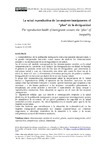Mostrar o rexistro simple do ítem
La salud reproductiva de las mujeres inmigrantes: el plus de la desigualdad
| dc.contributor.author | Ugarte- Gurrutxaga, M. Idoia | |
| dc.date.accessioned | 2020-12-18T08:31:04Z | |
| dc.date.available | 2020-12-18T08:31:04Z | |
| dc.date.issued | 2019 | |
| dc.identifier.citation | Ugarte Gurrutxaga, María Idoia (2019). La salud reproductiva de las mujeres inmigrantes: el “plus” de la desigualdad. Atlánticas. Revista Internacional de Estudios Feministas, 4 (1), 179-196. doi: http://dx.doi.org/10.17979/arief.2019.4.1.3705 | es_ES |
| dc.identifier.issn | 2530-2736 | |
| dc.identifier.uri | http://hdl.handle.net/2183/26964 | |
| dc.description.abstract | [Resumen] La vulnerabilidad de la población inmigrante está ampliamente documentada y se puede comprender teniendo como marco de análisis los determinantes sociales y su implicación en las desigualdades en salud. En el marco del modelo conceptual de los determinantes sociales de la salud propuesto por la Comisión para Reducir las Desigualdades en Salud en España, el género se postula como uno de los ejes de desigualdad que atraviesan la estructura social y que, en interacción con otros ejes como la clase social, la edad, la etnia o la raza y el territorio, determina jerarquías de poder y conlleva desigualdades en las oportunidades de tener una buena salud. A pesar del reconocimiento internacional sobre la importancia de la Salud Sexual y Reproductiva (SSR), el ejercicio de los derechos humanos en este campo está fuertemente limitado y existen graves barreras que impiden a las personas – y de forma particular a las mujeres- desarrollar plenamente su sexualidad, así como acceder a servicios y suministros de salud sexual y reproductiva necesarios. Esta situación se agrava en el caso de las mujeres inmigrantes. Es importante señalar que hay interés y preocupación respecto a la salud obstétrica de la población inmigrante, ya que numerosas investigaciones ponen de manifiesto la existencia de un grave problema de equidad en la salud perinatal de estas mujeres. Su salud reproductiva es mucho peor que la de las mujeres autóctonas. Entre los factores que contribuyen a la situación de vulnerabilidad de las mujeres inmigrantes destacamos las propias características del contexto migratorio, el abordaje biomédico de la atención a la salud y la escasa competencia cultural del sistema sanitario. | es_ES |
| dc.description.abstract | [Abstract] The vulnerability of the immigrant population is widely documented and can be understood by analyzing the social determinants and their implication in health inequalities. In the framework of the conceptual model of health’s social determinants, proposed by the Commission to Reduce Health Inequalities in Spain, gender is postulated as one of the axes of inequality that crosses the social structure and, when it interacts with other axes, such as social class, age, ethnicity or race and territory, determines hierarchies of power and entails inequalities in the chances of good health. Despite international recognition of the importance of sexual and reproductive health (SRH), in compliance with the human rights in this field is severely limited and there are serious barriers that prevent people - and women in particular - from developing fully their sexuality, as well as having access to necessary sexual and reproductive health services and supplies. This situation is aggravated in the case of immigrant women. It is important to point out that there is interest and concern regarding the obstetric health of the immigrant population, since many investigations have revealed the existence of a serious problem of equity in these women's perinatal health. Their reproductive health is much worse than indigenous women's. The incorporation of the intersectional perspective, which arises from the Feminist Theory, in the analysis of this situation facilitates the understanding of the underlying elements in the inequalities in reproductive health of immigrant women. Among the factors that contribute to the vulnerability of immigrant women, we highlight the characteristics of the migratory context (of differential character between men and women), the biomedical approach to health care and the scarce cultural competence of the health system. | es_ES |
| dc.language.iso | spa | es_ES |
| dc.publisher | Universidade da Coruña | es_ES |
| dc.relation.uri | https://doi.org/10.17979/arief.2019.4.1.3705 | es_ES |
| dc.rights | Atribución-CompartirIgual 4.0 Internacional | es_ES |
| dc.rights.uri | http://creativecommons.org/licenses/by-sa/4.0/ | * |
| dc.subject | Determinantes sociales de la salud | es_ES |
| dc.subject | Género | es_ES |
| dc.subject | Mujeres inmigrantes | es_ES |
| dc.subject | Salud reproductiva | es_ES |
| dc.subject | Competencia cultural | es_ES |
| dc.subject | Feminismo | es_ES |
| dc.subject | Feminism | es_ES |
| dc.subject | Breast cancer | es_ES |
| dc.subject | Women´s health | es_ES |
| dc.subject | Empowerment | es_ES |
| dc.title | La salud reproductiva de las mujeres inmigrantes: el plus de la desigualdad | es_ES |
| dc.title.alternative | The Reproductive Health of Immigrants Women: The Plus of Inequality | es_ES |
| dc.type | info:eu-repo/semantics/article | es_ES |
| dc.rights.access | info:eu-repo/semantics/openAccess | es_ES |
| UDC.journalTitle | Atlánticas – Revista Internacional de Estudios Feministas | es_ES |
| UDC.volume | 4 | es_ES |
| UDC.issue | 1 | es_ES |
| UDC.startPage | 179 | es_ES |
| UDC.endPage | 196 | es_ES |
Ficheiros no ítem
Este ítem aparece na(s) seguinte(s) colección(s)
-
REV - ATLÁNTICAS - Vol. 04, 2019 [19]
Número monográfico: La salud en la teoría y las vindicaciones feministas






